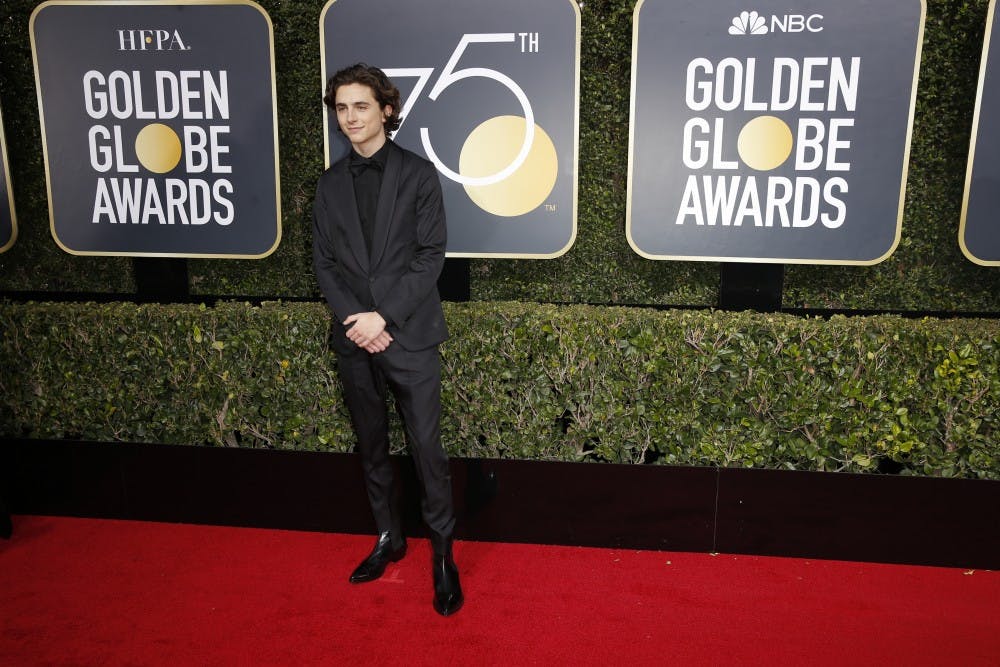Editor's note: All opinions, columns and letters reflect the views of the individual writer and not necessarily those of the IDS or its staffers.
In 2024, Bob Dylan topped my Spotify Wrapped again. Naturally, as a self-proclaimed Dylanite, I watched “A Complete Unknown” when it hit theaters over break, partly because Dylan had hailed Timothée Chalamet for his performance.
“He will be completely believable as me. Or a younger me. Or some other me,” Dylan said on X.
Now that I’ve seen the film, it wasn’t Chalamet’s voice coach, guitar lessons, practiced mannerisms, hours in the make-up department or some other exercise of pure acting prowess on his part that fully and finally transformed him into Dylan, though it all helped. No, it was one ill-conceived or, at any rate, ill-received skit on “Saturday Night Live” last weekend.
Many viewers lambasted Chalamet across social media for one joke about President Jimmy Carter’s death. Some included the moment in their “reasons why Timothée Chalamet should not win an Oscar this year” lists. All of it reminded me of the many occasions when Dylan stepped on audiences’ toes and received the same sort of backlash. Most of the time, it was because people thought they knew Dylan better than he did. From day one, he was called “the voice of a generation.” Not infrequently, that generation developed parasocial expectations of him.
“Their minds are filled with big ideas, images and distorted facts,” Dylan sang in his 1975 song “Idiot Wind.”
In the skit on “Saturday Night Live,” Chalamet played a fitness instructor leading his class in “the Jimmy Carter,” a move where they hung limp on bungee cords as if dead. The joke came less than a month after the former president died, and it must have landed on the in-studio audience hard because on the air you could hear the wind knocked out of — or into — them in one big collective gasp.
“A Complete Unknown” traces these sorts of incidents in Dylan’s life from the moment he stepped foot in New York (and onto New Yorkers’ toes) to one July night, five years later, when he decided to go electric at a folk festival. The crowd booed. The festival organizers looked for an axe to cut off the sound system. Dylan told his band, “Play it louder!” — with choicer words.
The movie ends there, but the story doesn’t. The next year, Dylan took his electric act abroad. In England, one member of the crowd cried out “Judas!” when he took the stage (a call I personally heard resurrected at one concert in 2023), as this article from Minnesota Public Radio relates. On the tour’s Scottish leg, a waiter pulled a knife on Dylan and called him a traitor to folk music. He whom others “knew” to be the protesting voice of their generation, these fans “knew” to be the folk messiah, who would bring their genre to the mainstream. One way or another, poor reactions to Dylan often began in parasocial knowledge.
Chalamet’s presidential faux pas recalls an even more on-the-nose mirror-moment with Dylan. Less than a month after President Kennedy was assassinated, Dylan received an award from the Emergency Civil Liberties Committee. The culture magazine Far Out notes in his acceptance speech, he said he “saw some of himself in Lee Harvey Oswald.” The crowd gasped and booed as he dug in his heels on stage.
Dylan explained what he meant, though he never apologized. Like Dylan, Chalamet has offered no apology. This isn’t to say that neither has ever apologized — or to argue whether, when, and for what either should. In different instances, both have. This is to appreciate that at any point they are willing to struggle with their audiences. Back-and-forth between an entertainer and their crowd reveals the entertainer as a complete unknown to us, whose mind exists somewhere beyond ours in that Who are you? I’ve never met you before. Please get away fog.
Throughout his career, this dynamic has shown that Dylan has his own eyes and ears with which he sees and hears the world, just like we do. Pure people-pleasing is an easy trap for someone under as much public scrutiny, but it comes with the risk of objectification and creation by the audience. Dylan has spent a career avoiding these things. Born Robert Zimmerman, he made himself into Bob Dylan. At concerts, he has refused to play his most well-known songs, opting instead for those that speak to him at that particular moment. Over his life, he has defined himself against crowds who thought they knew him, for better or worse. Last weekend, Chalamet did the same.
In a parasocial age, this struggle between artist and audience strikes me as increasingly important for both parties. While writing this article, I was curious about the results that Google would turn up for “parasocial.” First, the definition. Then, an example sentence that read, “A lot of parasocial relationships tend to give fans the feeling of ownership over the creator.”
That feeling of ownership is rooted in the idea that one has intimate knowledge of another person they don’t actually know. Bob Dylan’s logic of “complete unknowns” spoils this illusion and protects us from undue claims over people we’ve never met, a benefit to us and them. And this benefit doesn’t have to be limited to celebrities. We can apply it to anyone in our lives because, ultimately, life will be more exciting when we accept that our minds aren’t so large as to fit a whole other person within the width of our skull.
Accepting this will open us up to the thrill of the unexpected, both good and bad, but always real.
Eric Cannon is a freshman studying philosophy and political science and currently serves as a member of IU Student Government.






